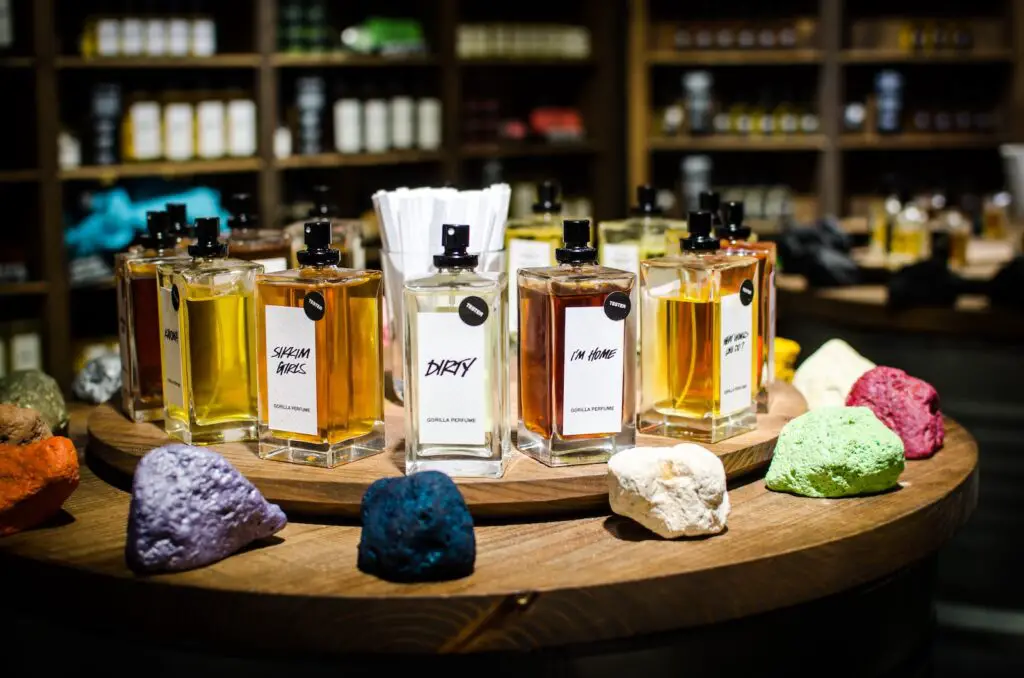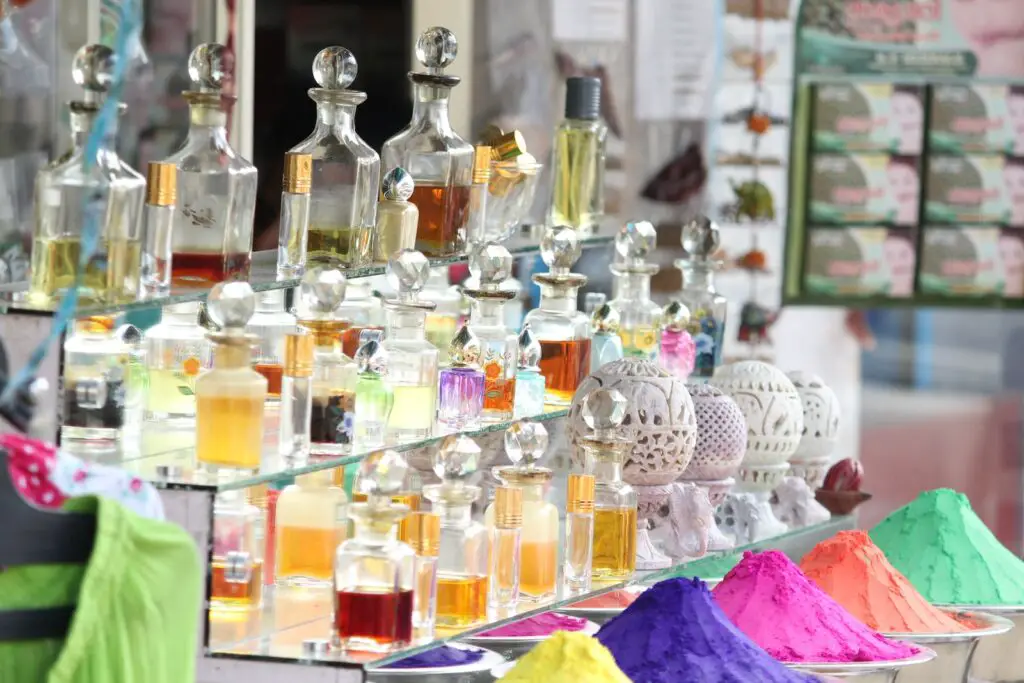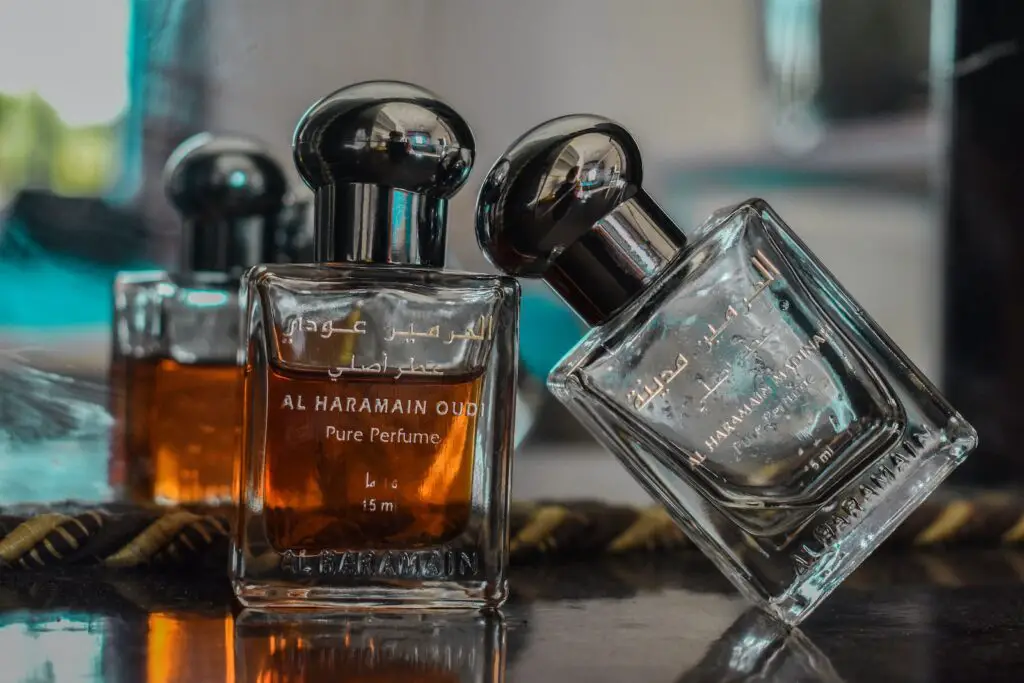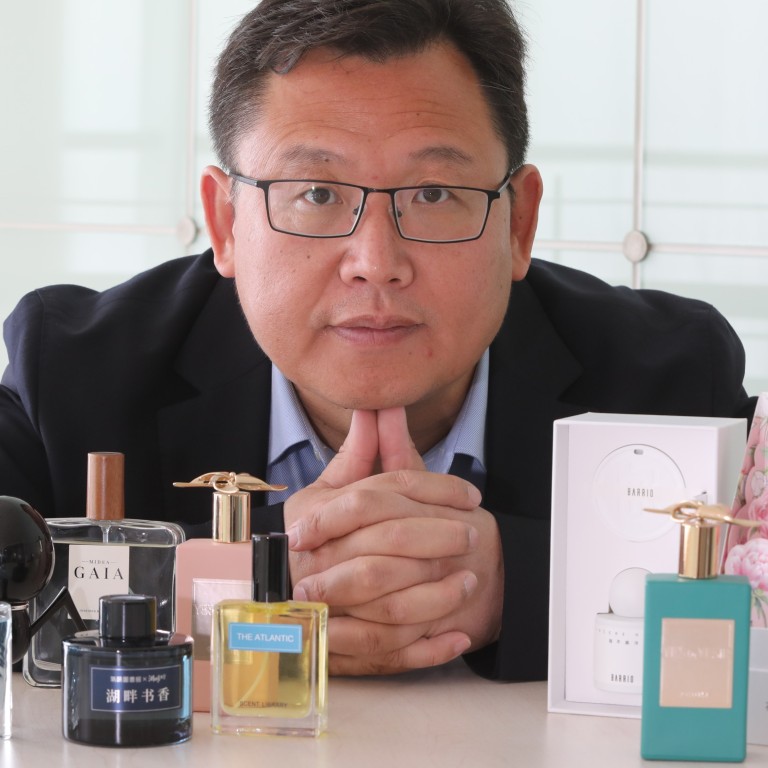Are you passionate about scents and love creating unique fragrances? If so, you may have wondered how to become a perfumer. Becoming a perfumer is an exciting journey that requires a combination of creativity, knowledge, and dedication.
You can be a perfumer to acquire knowledge of fragrance ingredients and develop a keen sense of smell. Additionally, gaining professional training and obtaining a formal education in perfumery would greatly enhance your skills and career prospects in this field.
We will explore the steps involved in becoming a perfumer, from education and training to building a portfolio and finding job opportunities. By following these steps diligently, you can pave your way towards a successful career as a perfumer. Let’s dive into the details and unravel the world of fragrance creation!

Developing Your Sensory Abilities
If you’re fascinated by the world of scents and dreaming of a career as a perfumer, then developing your sensory abilities is crucial. As a perfumer, your sense of smell and understanding of the olfactory system plays a cardinal role in creating captivating fragrances. Let’s explore some essential steps to enhance your olfactory senses and take your journey towards becoming a perfumer to new heights.
Understanding the Olfactory System
Before delving into the art of perfumery, it’s essential to have a solid understanding of the olfactory system. The human nose is a complex mechanism that allows us to detect and identify various scents.
The olfactory system comprises several components, including the olfactory epithelium, olfactory bulbs, and olfactory receptors. These receptors are responsible for capturing scent molecules and transmitting signals to the brain for interpretation.
Training Your Sense of Smell
Your sense of smell is like a muscle that can be trained and strengthened over time. To become a skilled perfumer, incorporating smell training exercises into your daily routine is essential. This practice involves exposing yourself to various aromas and consciously identifying and categorizing them.
You can start by focusing on everyday scents such as coffee, citrus fruits, or flowers, gradually moving on to more complex aromas like spices and essential oils. Consistency is key in this training process, as a regular practice will enhance your ability to distinguish between subtle scent nuances.
Exploring Different Scents
Expanding your olfactory repertoire is crucial in developing your sensory abilities as a perfumer. Take the time to explore and familiarize yourself with a wide range of scents. Visit perfumeries or fragrance stores to sample different perfumes, both mainstream and niche.
Engage with the fragrance community and participate in fragrance workshops to gain exposure to unique and unconventional scents. Additionally, experimenting with essential oils, raw materials, and fragrance families will provide you with a broad palette of scents to work with when creating your fragrances.
To summarize, developing your sensory abilities is an integral part of becoming a perfumer. Understanding the olfactory system, training your sense of smell, and exploring different scents will refine your olfactory skills and enable you to create captivating and innovative fragrances that leave a lasting impression. Embrace your olfactory journey and immerse yourself in the world of scents!
Studying the Science of Fragrance
Perfumery is an art that requires a deep understanding of the science behind fragrance. Aspiring perfumers embark on a journey to unravel the secrets of blending scents, creating harmonious compositions that captivate the senses. Here are the essential aspects of studying the science of fragrance, from the chemistry behind perfume to the understanding of fragrance notes and accords, as well as the importance of learning about raw materials.
Chemistry behind Perfume
To become a skilled perfumer, one must grasp the intricate chemistry that lies at the heart of fragrance creation. Perfume consists of various chemical compounds, each contributing to its unique scent.
The aromatic compounds found in natural ingredients like flowers, fruits, spices, and woods are extracted through different techniques, such as distillation or enfleurage. Understanding how these compounds interact with one another and how their molecular structures influence the overall composition is crucial.
Moreover, the knowledge of chemical reactions and olfactory perception allows perfumers to manipulate the scent profile of a fragrance. They can utilize the principles of esterification, oxidation, or reduction to change the intensity, longevity, or character of a perfume.
By experimenting with different ratios and combinations of aromatic compounds, perfumers can create an olfactory masterpiece that evokes emotions and tells a unique story.
Understanding Fragrance Notes and Accords
Fragrances are composed of different scent elements known as notes. These notes unfold gradually upon application, giving rise to what is commonly referred to as the perfume’s top, middle, and base notes.
The top notes are the initial impressions, which quickly evaporate, while the middle notes bring depth and complexity to the composition. Finally, the base notes are the foundation that sustains the fragrance’s aroma over time.
Learning to decipher and identify these notes is a vital skill for any perfumer. It involves an acute sense of smell, as well as a comprehensive understanding of the olfactory pyramid. Additionally, perfumers strive to create harmonious accords, which are unique combinations of notes that blend seamlessly together.
These accords can range from light and fresh to warm and sensual, depending on the desired effect. By mastering the art of fragrance notes and accords, perfumers can craft captivating scents that resonate with individuals on a deeply emotional level.
Learning about Raw Materials
A perfumer’s palette consists of a wide array of raw materials, each with its distinct scent profile and properties. From rose petals to vanilla beans, every ingredient brings its unique contribution to the fragrance composition. To excel in the art of perfumery, one must familiarize themselves with these raw materials.
Studying the olfactory characteristics of different flowers, spices, fruits, and woods, perfumers can appreciate the intricacies of each ingredient and how they blend. They learn about the origins, cultivation methods, and processes involved in extracting essential oils from these natural resources.
Furthermore, they understand how geographic factors and environmental conditions can influence the quality and scent of raw materials.
By deepening their knowledge of raw materials, perfumers can select the finest and most exquisite ingredients for their creations. They can explore the limitless possibilities of combining various botanical essences to create unique and captivating fragrances that enchant the senses.
Mastering the Art of Perfumery

Creating a Fragrance Concept
At the heart of every captivating perfume lies a well-defined fragrance concept. This is the initial step in the perfumery process, where you envision and define the essence of your perfume. To create a fragrance concept, consider the emotions, memories, or characteristics you want your perfume to evoke.
Start by outlining the key theme or inspiration behind your perfume. It could be a specific event, a natural element, or even a personal experience. Think about the mood you want your fragrance to convey – whether it’s vibrant and energetic, tranquil and soothing, or seductive and alluring.
Once you have a clear vision in mind, you can start selecting the perfume ingredients that align with your concept. Research different fragrance families and their typical ingredients to help you formulate a well-balanced and harmonious scent.
Blending and Layering Scents
Blending and layering scents is where the true artistry of perfumery comes to life. It involves delicately combining various fragrance notes to create a multifaceted and unique aroma.
When blending scents, consider the different fragrance notes: top, middle, and base. Top notes are the first impression of the perfume, often fresh and vibrant. Middle notes develop as the initial notes fade, adding depth and complexity. Base notes are the foundation of the fragrance, providing longevity and stability.
Experiment with different combinations of these notes, keeping in mind how they interact with one another. Consider the balance between floral, fruity, woody, or spicy scents. Don’t be afraid to think outside the box and explore unconventional pairings that evoke emotions and create a lasting impression.
Experimenting with Different Formulations
In the world of perfumery, experimentation is key. Each formulation you create is an opportunity to refine your skills and unleash your creativity. However, it’s essential to ensure consistency and reproducibility in your formulations.
Start by familiarizing yourself with the fragrance pyramid, a structure that organizes the different scent layers. This will help you understand the ideal proportions of each fragrance note in your formulation.
Keep detailed records of your experiments, noting the specific measurements, ingredients, and blending techniques used. This will enable you to recreate successful formulations and make adjustments when needed.
Remember, the process of perfecting your formulations takes time and patience. Embrace the journey and allow yourself to learn from both the successes and the failures along the way.
Education and Training
If you aspire to become a perfumer, a solid education and training are crucial to develop the necessary skills and knowledge. There are several paths you can take to pursue a career in perfumery. Whether you choose to enroll in a perfumery program, attend workshops and seminars, or work as an apprentice, each option offers unique opportunities to learn and grow in this creative field.
Choosing a Perfumery Program
Choosing the right perfumery program is a pivotal step in your journey toward becoming a perfumer. These programs provide an in-depth understanding of the art of fragrance creation and help you refine your olfactory skills. When selecting a program, consider factors such as curriculum, reputation, and alumni success.
One highly regarded perfumery program is the International Fragrance Academy. Their comprehensive curriculum covers everything from raw materials and formulation techniques to market trends and product development. By studying under experienced perfumers, you can gain valuable insights into the industry and refine your artistic style.
Another renowned option is the Grasse Institute of Perfumery, located in the heart of Grasse, France. Known as the birthplace of perfumery, Grasse offers a rich history and expertise in fragrance creation. Their program combines theoretical knowledge with practical hands-on experience, allowing you to explore the various aspects of perfumery.
Attending Workshops and Seminars
Attending workshops and seminars is an excellent way to supplement your perfumery education and expand your knowledge. These events offer a more flexible and focused learning experience, allowing you to dive deeper into specific areas of interest.
A notable workshop is the Art and Olfaction Workshops, which bring together industry professionals and perfume enthusiasts. Through hands-on exercises and discussions, you can explore different scent families, experiment with blending techniques, and gain valuable feedback from experts in the field.
Another option is the Perfumer’s Apprentice Program by The Institute for Art and Olfaction. This program offers a range of workshops that cater to beginners as well as seasoned perfumers seeking to refine their craft. From perfume formulation to scent evaluation, these workshops provide practical skills and a community to connect with like-minded individuals.
Working as an Apprentice
Working as an apprentice under the guidance of an established perfumer allows you to learn firsthand from a mentor and gain practical experience in the industry. This traditional approach to perfumery training offers a unique opportunity to develop your skills in a real-world setting.
One renowned perfumer who offers apprenticeships is Francis Kurkdjian. Known for creating iconic fragrances, his apprenticeship program provides an immersive learning experience where you can observe and participate in the fragrance creation process. This firsthand exposure to the art and business of perfumery is invaluable for honing your skills and building a network of industry contacts.
The Maison Guerlain also offers an apprenticeship program, providing aspiring perfumers with the opportunity to work alongside their master perfumers. This esteemed perfume house has a long history of creating luxurious scents and offers a structured training program that covers all aspects of the perfumery craft.
Building a Career as a Perfumer

Networking in the Industry
When it comes to building a career in the world of perfumery, networking plays a pivotal role. Developing connections with industry professionals and like-minded individuals can open doors to various opportunities and provide invaluable guidance. Here are a few tips to enhance your networking game:
- Attend industry events such as fragrance exhibitions, trade shows, and conferences. These events provide unparalleled opportunities to meet professionals, learn about new trends, and expand your network.
- Join online perfume forums and communities to connect with fellow perfumers, aspiring professionals, and fragrance enthusiasts. Engaging in conversations, sharing insights, and seeking advice can help you build relationships and gain visibility within the community.
- Participate in workshops and courses offered by renowned perfumers or perfume houses. These educational experiences not only enhance your skills but also allow you to interact directly with experts in the field.
Creating a Portfolio
A well-crafted portfolio is essential for showcasing your skills and creativity as a perfumer. It acts as a visual representation of your olfactory achievements and can greatly impact potential clients or employers. Consider the following guidelines to create a compelling portfolio:
- Include a variety of fragrance compositions that demonstrate your versatility and range as a perfumer. Whether it’s elegant floral bouquets or unconventional scent combinations, presenting diverse creations can leave a lasting impression.
- Provide concise descriptions for each fragrance, emphasizing the inspiration behind your compositions and the emotions they evoke. Additionally, include any notable accomplishments or recognition your creations have garnered.
- Consider incorporating visual elements such as mood boards, images, or package designs to enhance the visual appeal of your portfolio. These elements can help convey the aesthetic vision and overall brand identity associated with your fragrances.
Finding Job Opportunities
Securing job opportunities in the field of perfumery requires a proactive approach and strategic planning. Here are some effective methods to find potential employment:
- Research perfume houses, fragrance manufacturers, and beauty brands known for their fragrance lines. Visit their websites, explore career sections, and keep an eye out for job postings.
- Reach out to established perfumers or industry professionals for mentorship or internship opportunities. Gaining practical experience through internships or apprenticeships can provide valuable insights into the industry and help you build a solid foundation for your career.
- Consider starting your own niche perfume brand or offering freelance perfumer services. With the rise in demand for unique and personalized fragrances, entrepreneurial ventures can be a viable path to establish yourself in the industry.
By utilizing these strategies and continuously honing your craft, you can increase your chances of building a successful and fulfilling career as a perfumer. Remember, perseverance and dedication are key ingredients for navigating the fragrant path ahead.

Credit: www.scmp.com
Final Words
Becoming a perfumer requires a combination of passion, creativity, and dedication. By starting with a strong foundation of knowledge on fragrance ingredients, aroma chemistry, and scent composition, aspiring perfumers can gradually hone their skills through practice and experimentation. Additionally, seeking mentorship or formal education in the field can provide valuable guidance and help open doors to job opportunities.
Remember, the path to becoming a successful perfumer is unique for everyone, so keep exploring, creating, and following your nose to make your mark in the fascinating world of fragrance.
